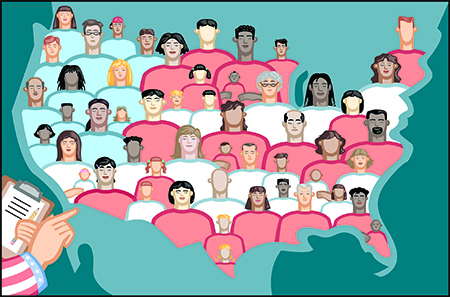 There are three ways to fill out the 2020 Census form — by mail, by phone or online.
There are three ways to fill out the 2020 Census form — by mail, by phone or online.
Due to the rapid spread of COVID-19 and various shelter-in-place ordinances, a majority of United States residents may be filling out the 2020 Census form online this year.
Ragib Hasan, Ph.D., associate professor in the University of Alabama at Birmingham’s College of Arts and Sciences Department of Computer Science, says everyone should be on alert for potential cyberphishing attacks.
Enter your personal information at the correct website
“Please make sure that you type in the address rather than click on a website you have found via a web search or from a link in an email or other place,” Hasan said. “Cybercriminals often take advantage of this by creating fake phishing websites that look like the real site, but are designed to steal your sensitive personal information.”
Watch out for suspicious Census emails
Hasan says crooks may send you a phishing email pretending to be from the Census Bureau.
“These phishing emails can contain links to their phishing websites. Also, cybercriminals can do typo squatting, which refers to setting up websites with very similar-looking names that differ from the actual site by a letter or two.”
To ensure your personal data is safe, make sure to type in the correct Census website and double-check for spelling mistakes in the website URL.
| UAB is counting on you. Learn why the 2020 Census is important at uab.edu/uabcounts. |
Fill out the form on a secure computer
“Do not use any public computers to enter your information,” Hasan said. “There can be key logger or other malware on the computer to steal your data.”
Hasan warns people to beware of cybercriminals pretending to be from the Census Bureau.
“According to the Census Bureau, they will never ask for your Social Security number, bank account information, credit card numbers or information on political affiliations.”
Benefits and disadvantages
Hasan says filling out the information online has both benefits and disadvantages.
“With a majority of the U.S. population owning smartphones, these days it is easier for collecting information online,” Hasan said. “Filling out and sending a form online is much more convenient to many people compared to filling out paper forms and mailing them.”
“The disadvantage is of course privacy — with so many incidents of data leaks from major companies, people are sometimes wary to enter their detailed personal information online. I think the key to solving this is to inform the people about proper security best practices, how they can enter the information in a secure manner at the correct website. I also think people should be made more aware of the legal guarantees of privacy of Census data.”
Under Title 13, the Census Bureau cannot release any identifiable information about you, your home or your business, even to law enforcement agencies. The law ensures that your private data is protected and that your answers cannot be used against you by any government agency or court.
What you need to know
UAB expert Peter Jones, Ph.D., assistant professor in the College of Arts and Sciences Department of Political Science and Public Administration, says the Census is encouraging people without internet access to call since they have the ability to record responses in 50 different languages.
“The Census would also like for college students to report themselves as living on campus if that is where they would have been on April 1,” Jones said.
The Census Bureau is extending the deadline to Aug. 14 instead of the original ending date of July 31.
To find more information, visit my2020census.gov.